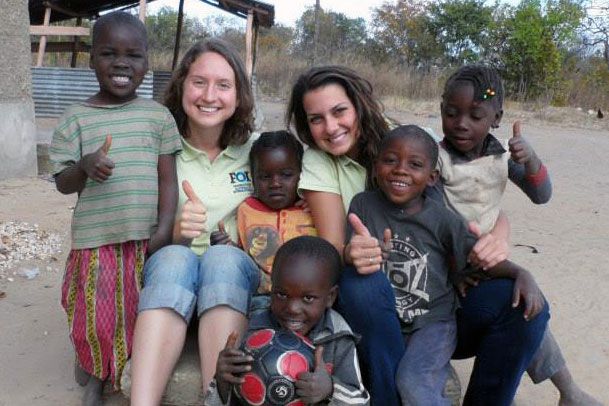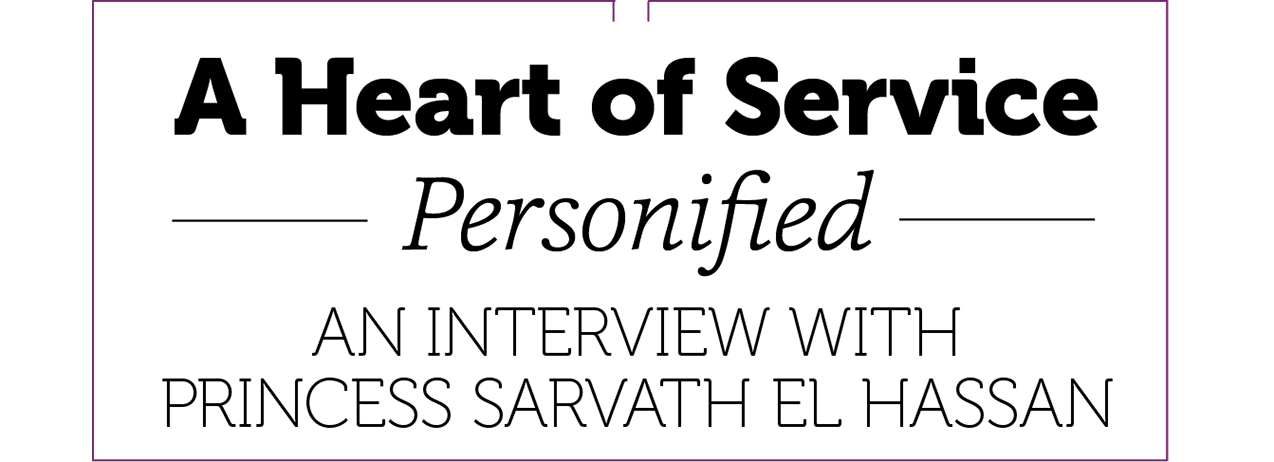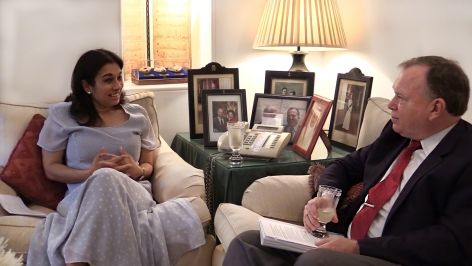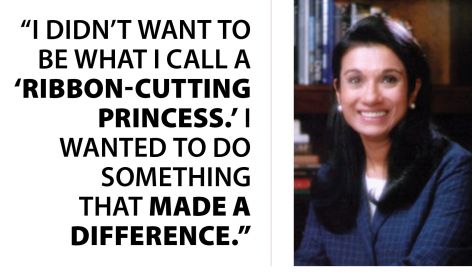There are two basic ways of living—giving and getting. We see the results of selfishness all around us. How can we nurture a heart of service?

It was a time not unlike what we see so often today with competing leaders and factions manipulating the people to serve their own ambitions.
In the mightiest nation on earth at the time, a perfect political storm was brewing—a bad mix of an out-of-touch king bent on preserving his power, a people overburdened by years of heavy taxation and forced labor, and a savvy opposition leader seizing on their discontent to slickly position himself to usurp the throne.
The nation’s fate would turn on a single decision. The king had heard the people’s entreaty—“lighten the burdensome service of your father, and his heavy yoke which he put on us, and we will serve you”—and now pondered two conflicting solutions offered by his advisers.
The advice of the old, experienced men was profoundly insightful to the way things work in life: “If you will be a servant to these people today, and serve them, and answer them, and speak good words to them, then they will be your servants forever.”
But wisdom often falls on deaf ears. Their counsel irked the king, so he turned to his young friends. They urged him to crush the dissent! “Say to them: ‘My little finger shall be thicker than my father’s waist!’” In other words, you think my father’s yoke was heavy? Wait till you see mine!
And blind to the rule of reciprocity—that serving others in love would inspire his people to love and serve him in return—he chose the philosophies of so many leaders throughout history: I’ll govern by command and control. My subjects are there to serve me; I’ll sacrifice what’s good for others for what’s good for me.
The nation was ancient Israel, at its height of supremacy following wise King Solomon’s death. But his son Rehoboam’s foolish decision quickly rent it in two, a division from which it never fully recovered.
This story, found in the Bible in 1 Kings 12, is nearly 3,000 years old, but its lessons are as relevant today as ever.
The scourge of “me first!”
The self-serving approach continues to be one of society’s greatest scourges, yet humanity seems to never learn. We perpetuate the philosophy that “the way of get” is the way to happiness and success, but the “me first” path of life always leaves a trail of hurt. It never results in greater good for society, and when people who wield power over others choose that path, its effects are devastating.
Few of us lead nations, but most of us lead in our families, our businesses and our communities, and the leadership principles are the same for all. How many marriages and families owe their strength to selfless love? How many have been torn apart by someone’s “me first” self-interest?
One of the end-time signs
It’s a principle worth examining, because the Bible warns of intensifying selfishness in the last days leading to a time when, as Jesus said, “Because lawlessness will abound, the love of many will grow cold” (Matthew 24:12).
The apostle Paul in 2 Timothy 3:1-5 specified 19 “perilous times” indicators of the last days. Topping the list is “men will be lovers of themselves,” and many that follow also link directly to self-centeredness. They are “perilous” because they inevitably wreck character, create conflict and hurt others.
The self-serving disposition so pervades human nature that even the 12 disciples of Jesus struggled with it, on three separate occasions arguing about who would get the greatest positions in the Kingdom of God! Jesus kept reminding them that such an approach is futile. If they were to follow God, “it shall not be so among you; but whoever desires to become great among you shall be your servant. And whoever of you desires to be first shall be slave of all. For even the Son of Man did not come to be served, but to serve, and to give His life a ransom for many” (Mark 10:42-45).
Humanity desperately needs people who don’t just talk about Jesus, but who actually walk in His steps.
The attitudes the disciples and Rehoboam projected are not exceptions to the rule. No, we naturally gravitate toward these deeply rooted ways of thinking. Jesus’ instructions, along with case studies such as Rehoboam, serve as barometers by which we can gauge our own lives.
What about you? Are you primarily a “me first” or an “others first” type of person? A giver, or a getter?
Every one of us is predominantly one or the other, but a heart of service can be developed! Here are some steps you can take.
Follow the model, be the model
Jesus Christ didn’t just talk, He modeled what “the give way of life” is all about. When He saw others in need, He helped. When He saw suffering, He healed. When He saw ignorance, He taught. When He saw people abused, He defended them. He comforted, He prayed for, He cared for people, even His enemies.
Humanity desperately needs people who don’t just talk about Jesus, but who actually walk in His steps, who “visit orphans and widows in their trouble,” and keep themselves “unspotted from the world” (which is full of selfishness), as James 1:27 describes “pure religion.”
Foundation Outreach International volunteer Joel Bosserman (right) stands with one of his students at an art
sale featuring work by students at the YMWA Centre for Special Education in Amman, Jordan; one of the YMWA
Centre’s students paints a craft
Selflessness is one of the greatest qualities parents can impart to their children. Teach them, yes, but nothing is more powerful than letting them see their parents model a servant’s heart. Such parents give their children a much better chance to grow up to be givers, not takers.
Engage others in service
I knew a family in America whose Thanksgiving traditions included serving meals at a women’s shelter before going home to their own feast. By involving their children in this service, they instilled in them compassion, wisely raised their awareness of life’s harsher realities, and developed in them the habit of helping the less fortunate.
Sometimes people in the workplace, school or neighborhood are willing to help, but depend on others to get a project going. You may be the one who helps others help!
See a need, fill a need
The accompanying article about Jordan’s Princess Sarvath El Hassan tells of someone who simply saw a humanitarian need and worked to fill it. Her efforts over 40 years have now touched thousands of people.
People all around are hurting. What can you do, what will you do, to make a difference in their lives? Jesus’ stirring parable of the Good Samaritan (Luke 10:25-37) showed how people heartlessly ignored an injured man until a Samaritan—people commonly looked down upon—mercifully stopped to help. He ends the story by saying, “Go and do likewise.”
It’s simple, really—see a need, fill a need. Whether it helps one or 1,000, your service is worth it
It’s good for you!
Those who serve do more than impact others—they help themselves! In a world where love is growing more and more cold (Matthew 24:12), it’s outgoing concern, selflessness, giving and caring that will protect your heart, that will keep you warm.
Everyone chooses his or her road in life, and with it the consequences. We can take the wide, well-traveled Highway of Get, which leads to destruction, or we can take the narrow path, the Way of Give, that leads to life. It will make all the difference in the world, not only for all who meet you on your journey, but also for you!

Princess Sarvath El Hassan of Jordan is an inspiring leader in a troubled part of the world. She has made a difference for her people and for the volunteers who serve them.
By Clyde Kilough
Only 45 miles from Jerusalem, where the corrupt King Rehoboam chose self-interest over serving his people nearly 3,000 years ago, today we can find someone, also a member of royalty, who has chosen to set a different example.
Some 40 years ago Princess Sarvath El Hassan, wife of Prince El Hassan bin Talal of Jordan, determined to fill a crying need for her people. Today, nearly 2,500 poor Jordanian families with mentally challenged children are living witnesses to how her efforts, and those of others who joined with her, forever changed their lives.
Starting from scratch and through hands-on hard work, she has overseen the Young Muslim Women’s Association (YMWA) Centre for Special Education in Bunayat from its meager beginnings. It started with only 18 students and three staff in 1974 and now serves over 170 students in its preschool, school and prevocational sections.
Princess Sarvath El Hassan has gone on to sponsor and support numerous other humanitarian and educational projects in Jordan, and has also welcomed volunteers from around the world. They, too, have had their lives changed forever through the experience of serving. Since 1982, 150 young adult volunteers have worked in these projects under the auspices of first the Ambassador Foundation and, today, Foundation Outreach International (FOI). FOI exists to promote humanitarian projects and the development of leadership and character in the lives of all people, but especially among the youth and young adults around the world.
In May 2014 Princess Sarvath El Hassan, in an interview with Discern, told her story. It’s an inspiring story of how a simple idea, combined with a desire to serve, can profoundly affect people far beyond what we imagine. It is a modern example of how leadership can be, and the difference it can make!
Following are excerpts from our conversation:
Discern: What led to your passion and involvement with [this project]?
Princess Sarvath El Hassan: Well, that was very simple. I came to Jordan 46 years ago, and I wanted to do something, but I didn’t want to be what I call a “ribbon-cutting princess.” I wanted to do something that made a difference. I looked around and found at that time there was nothing in the country for the educable handicapped. I thought, “What about the young people who actually can make something of their lives and what about their families?”

So we started fund-raising. We started making, literally, jams and jellies; and I sewed so many soft toys and made candles—you know, that really sort of small cottage industry.
We managed finally to raise $20,000. And when we raised $20,000, my husband gave us $20,000. At that time the present king of Bahrain—a very good friend of my husband’s—was visiting, staying with us. He saw me busy making candles and things and asked, “What are you doing?” I told him, and he gave me $20,000.
So we ended up with $60,000. And with that $60,000, we sent three child psychologists, educators, one to America, one to Britain, and a lady who went to Norway because she specialized in the vocational aspect of things. Those three came back and started the school with 20 children in an apartment and, as they say, the rest is history.
Q: I think your website said you’ve had [since opening] something like 2,000 families affected.
A: At least! And it’s families. I would say 90 percent of our students that come are very, very financially disadvantaged. So actually, when we get a child into this center, we’re actually helping the family.
Q: What is your greatest sense of gratification now, looking back on 40 years of the school?
A: Obviously we have affected positively these families and these young people, but I also think we’ve affected the mind-set. When I started it, I had to put up with quite a lot of flak because [to] a lot of people in the region—and if you think about it, even way back in the States—the handicapped were something to be hidden. And there was even a thought that, perhaps, it was a punishment to the family—they had done something wrong so God had sent them a handicapped child.

And I think now—maybe it’s the world, maybe it’s the country—no one would say that. They have realized that these people contribute to society; it’s our responsibility to take care of them. And [there are] many centers now, as you know, in the country—some good, some not so good—but I think the mind-set has changed.
And if we’ve done a little bit to help that, I’d be pleased.
Q: Over the time that you’ve seen this program for a number of years, you’ve seen the volunteers come and go. Can you speak to what they have contributed to it, and, maybe what you’ve seen how it has affected them and changed their view of life?
A: I think the concept of volunteerism is not very strong in the Arab world, so to see these bright young people coming in, giving of themselves, giving of their time, for very little financial reward—none virtually—but a lot of personal satisfaction, I think that was a very good object lesson to everyone around. Especially the ones who worked in Bunayat and who also worked in the Al-Hussein Center for the handicapped.
So I think from that point of view it was very valuable, apart from what they actually brought—the skills, the music, the art, even some of them were fantastic in administrative skill. At many levels they contributed to the success of the center. But I think what they also showed from the point of view of altruism and, you know, doing something for other people, was very valuable.
Q: When your children were little, did you try to consciously instill in them [the mind-set of serving others]?
A: I don’t think consciously; it’s just the atmosphere you grow up in. They saw their father working, me working. That’s how I saw it, because my parents were involved in this sort of thing. My grandparents started projects, they did things, they supported people, they educated people. I think it’s the environment that you grow up in, really.





